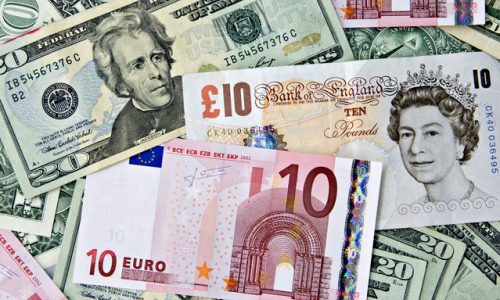
The US dollar is getting weaker against the euro and the pound sterling in trading on Monday.
This week traders’ attention is focused on January data on consumer price dynamics in the states. Experts fear that the report of the U.S. Labor Department to be published on Tuesday will confirm that the fight against inflation is far from over, thus dispelling hopes that the cycle of monetary tightening by the Federal Reserve System (FRS) will soon be over.
According to an expert consensus forecast cited by Trading Economics, U.S. consumer prices rose 6.2% year-over-year in January, up from 6.5% in December.
“Depending on what the inflation data are, we could see either markets breathe a sigh of relief or risk aversion accelerate,” said Standard Chartered Plc analyst Eric Robertsen.
“The more the Fed extends the cycle of rate hikes and delays the transition to rate cuts, the more likely it is that the U.S. economy will “hard land” and that the U.S. central bank will have to lower the rate more aggressively in the future,” Robertsen was quoted as saying by Bloomberg.
University of Michigan data released Friday showed that Americans’ inflation expectations for the medium term (next year) rose to 4.2% in February from 3.9% in January.
The ICE-calculated index showing the dollar’s performance against six currencies (euro, Swiss franc, yen, Canadian dollar, pound sterling and Swedish krona) added 0.11% on Monday, while the broader WSJ Dollar Index gained 0.22%.
The euro/dollar pair is trading at $1.0669 as of 8:10 a.m., up from $1.0679 at the close of the previous session.
The pound is at $1.2047, up from $1.2060 on Friday.
The dollar’s value against the yen rose to 132.17 yen from 131.4 yen in previous trading.
On Tuesday the Japanese government will submit a candidate for the post of the Central Bank head to the parliament. On Friday the Japanese mass media informed that Prime-Minister Fumio Kishida chose Kazuo Ueda, 71-year-old, from the list of candidates for the post. The current head of the Bank of Japan, Haruhiko Kuroda, will step down in early April.
Initially, investors interpreted the decision to choose Ueda as a potential “hawkish” signal, said Bloomberg. That opinion, however, changed after his speech to reporters, during which he said he believes the Bank of Japan’s current ultra-soft policy should remain unchanged.